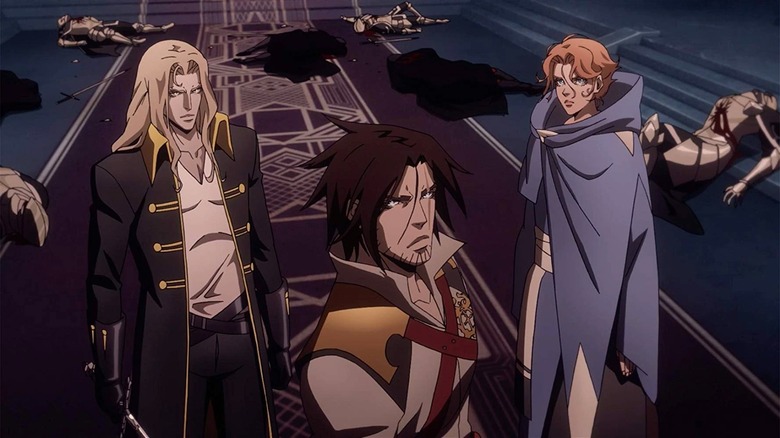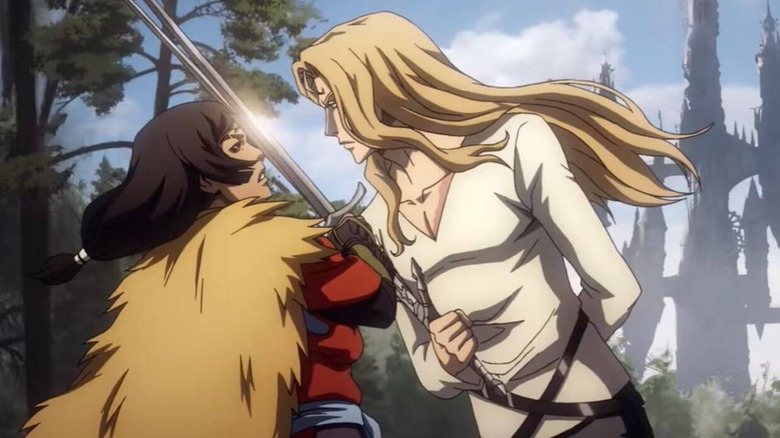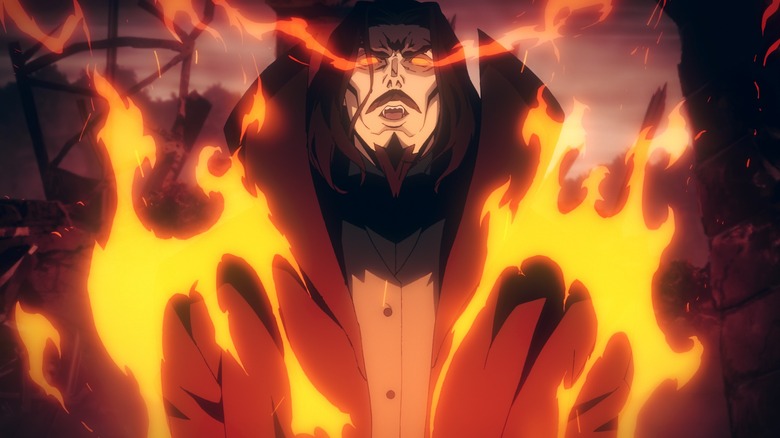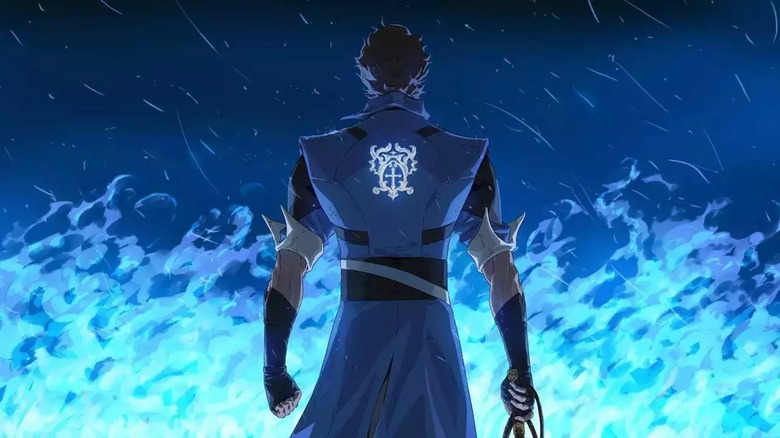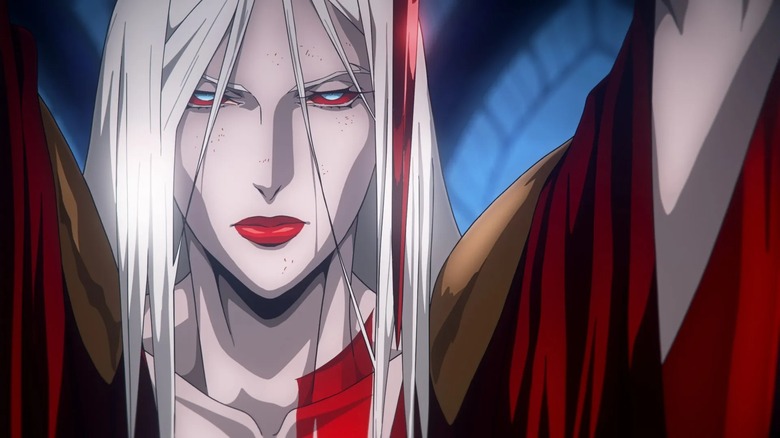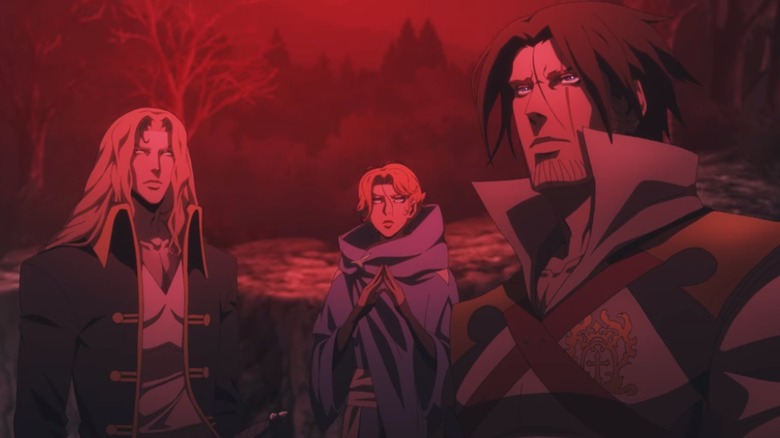Every Season Of Netflix's Castlevania Ranked
A 1989 action-platform Konami game sets its supernatural setting in 1476 Wallachia, with Count Dracula ravaging Europe with the aid of a freshly spawned army of monsters. When all efforts to thwart him fail, the people call for the legendary vampire hunter Trevor Belmont — the current wielder of the Vampire Killer whip — who becomes our playable character joined by sorceress Sypha Belnades, pirate Grant Danasty, and the vampire Alucard. This game, "Castlevania III: Dracula's Curse," later laid the foundation for the first season of Netflix's "Castlevania," and the four-season series went on to expand upon these legacy characters in ways that elevate the source material's dizzying, captivating lore. Although the "Castlevania" games are still beloved to this day, the Netflix series helped popularize the franchise's most memorable aspects, all the while wrapping up the lore in a blood-splattered spectacle that can both thrill and horrify.
"Castlevania" has always been about killing Dracula and stopping the deluge of destruction unleashed upon the commonfolk by a man who has crossed the point of no return. Any semblance of humanity that the Count embraced when he was in love ended when Lisa Tepes was burnt alive, and what followed was a rejection of divinity, morals, or compassion, as the same grace was never extended to him. Through Trevor, Sypha, and Alucard's meandering yet unified journey, we glimpse the limitations and excesses of vampirism, the political machinations that emerge when one wields such an alienating power, and the collateral damage inflicted as the result of a tragedy that should've never happened in the first place.
My ranking of Netflix's "Castlevania" includes "Castlevania: Nocturne," which functions as a sequel to the parent series and fits snugly into the timeline as it anticipates and fleshes out the aftermath of a world plunged into darkness even after the defeat of the greatest threat. Although every season of "Castlevania" has something thrilling to offer, I will be ranking them as per the quality of the stakes (no pun intended) raised and fulfilled, along with the depth of the arcs that drive our characters to their inevitable ends.
5. Castlevania: Season 3
Despite ranking season 3 last, I want to underline that it is still an extremely enjoyable, valuable entry within the series, as it helps us fill the void left after the death of the antagonist and the adjustment period required before the emergence of the next threat. Dracula — Vlad Tepes — is a complex figure who warrants both empathy and frustrated disdain, as his actions, although cruel, stem from a brand of grief so pure and human that it is difficult to condemn him for harboring such vitriol. His death leaves a void in the series, especially in Alucard's heart, as he has to contend with the complicated remnant of a relationship that festered before being cut off while dealing with the absence of both Trevor and Sypha. These episodes embrace a more languid pace, but help us understand what makes every character tick.
The penultimate battle between the monks and the Judge's men, followed by the opening of a portal to Hell, against the backdrop of a thousand Night Creatures wreaking havoc, sets the tone for the final season to come. This sequence is juxtaposed with two instances of betrayal, where physical intimacy is leveraged to trap a person in an impossible situation, although the outcome is wildly different for Hector and Alucard. Season 3 underlines the themes of self-fulfilling prophecies, the nature of evil, which is often hidden in plain sight, and the toxic cycle of vulnerability and betrayal that pushes even the most balanced individuals toward ruin, compelling them to cut off all sources of comfort.
4. Castlevania: Season 1
The brevity of the first season belies the emotional impact of the events that unfold, as so much happens over the course of the four-episode entry despite only laying the foundation for what's to come. The season premiere manages to establish Vlad as someone who relishes his humanity despite his monstrous nature, as he allows himself to be swept by the ambitious and kindhearted Lisa Tepes, with whom he finds solace after falling in love. The stake-burning sequence is devastatingly effective for many reasons: Lisa's painful screams and curses as she's being burnt alive evoke a jarring contrast to the superstitious townsfolk who watch in complacent silence, with the religious figureheads exposing themselves as morally bankrupt. This apathy crumbles when faced with Vlad's anguished declaration that he will kill every last one of them in a year's time, and this chilling promise is soon forgotten and scoffed at, raking up a high price.
Season 1, although brief, establishes a vivid world filled with characters motivated by emotions that brim beneath their stoic surfaces, and how these inexplicable forces often find a way to come together and forge a common purpose. Trevor Belmont's arc from a person removed from his family's formidable legacy to someone actively involved in furthering it unfolds organically, and his fight with Alucard infuses their budding dynamic with layers of tension and empathy, despite how viciously they end up clashing swords. The season ultimately ends on a note of hope, with the heroes banded together on a quest to defeat an evil that was begotten by a more intrinsic form of evil — one that remains hidden until it suddenly rears its terrible head.
3. Castlevania: Nocturne - Season 1
"Nocturne" is an excitingly fresh return to the world of "Castlevania," imbibing the most beautiful aspects of the video games it is based on — "Castlevania: Rondo of Blood" and "Castlevania: Symphony of the Night" — and the series reminds us of the franchise's strength. "Nocturne" hinges a lot of its aura on its predecessor, but manages to etch out a convincing tale set amid the French Revolution, where the tenets of equality and freedom are inverted to underline the grotesque nature of evil, which always finds a way to mutate and endure. We follow Richter Belmont this time as he grapples with his legacy and the overwhelming need to exact revenge, yet finds himself bound by the strings of fate until he is led straight to a dangerous, transformative quest he will never forget.
Of course, the Revolution is used to etch out much more than socio-political upheaval and change, as it is also characterized as a full-out war between undead ghouls and those who wish to abolish a system built on inequity and rampant bloodshed. Then there's the unsettling promise of the rise of a vampire Messiah, threatening to squash all hopes for change, while the aristocrats go up against one another in the wake of a world that will soon be plunged into literal darkness forever. "Nocturne" often stumbles when it comes to wrapping up loose ends, as the exquisite buildup and execution feel suddenly robbed of tact or originality. Nevertheless, it emerges as a quintessential "Castlevania" experience overall, and one that pays homage to the original games in the bloodiest, most visceral ways.
2. Castlevania: Season 4
Season 4 is all about payoffs after its predecessor takes the time to set the stage, between the imminent return of Dracula and the end of Wallachia that is promised along with it. Isaac has always been an interesting character, and his arc culminates wonderfully in the final season when he infiltrates Carmilla's fortress and fights her after she's overwhelmed with rage. After taking Styria for himself, Isaac discards plans for revenge and urges Hector to do the same, stating that "Revenge is for children," a sentiment only the immature cling to when wronged by the arbitrary cruelties of the world. Isaac's wisdom prevents the return of Vlad Tepes — who, he insists, has suffered enough — but fate has something more unsavory in store for the central trio, who must soon face the elemental incarnation of Death.
The Isaac-Carmilla fight is one of the many crowning jewels of this season, as these fight sequences not only capture the frenetic intensity of those driven by their twisted needs and desires, but they also underline the price of reaching such extreme moral junctures and hyper-fixations. The climactic final battle (which is also beautiful to behold) is followed by surprisingly endearing revelations, including the resurrection of Vlad and Lisa, the unexpected return of Trevor, and the reunion of three friends who love each other dearly and will continue to do so until the end. This is one of the few instances where the "happily-ever-after" formula feels hard-earned, and where the tentative hope for a new beginning feels believable against all odds.
1. Castlevania: Season 2
The reason season 2 of "Castlevania" feels so satisfying lies in the narrative nuances strewn across this entry, where painstaking, character-focused attention to detail goes hand in hand with the larger-than-life spectacles of magical confrontations and vampiric might. Despite being tightly paced, this season often relishes its thematic profundity in the form of a ruminative monologue or a parable that reveals a lot more than it lets on, where characters such as Godbrand or Isaac use everyday mundanities to illustrate the struggles of humanity. This sense of humanity also extends to the undead, as the vampiric souls seem equally discontent with the notion of happiness and its longevity, deeming their terrifying powers hollow during fleeting moments of vulnerability before inevitably brandishing their fangs to strike.
The central trio — Trevor, Sypha, and Alucard — remain indispensably powerful throughout this season, but we are afforded rare glimpses into their insecurities, along with how past traumas weigh heavy upon each of them. Perhaps Alucard undergoes the most heartwrenching ordeal, as he has to kill his own father for the sake of Wallachia, and for the sake of his friends, and no amount of moral justification is enough to lift the impossible burden of such an act. Even in acts of solidarity and emotional solace, each of these characters feels alone, making their complexities shine best when they eventually overcome these limitations down the line. Heartbreak is the name of the game in season 2, but it is the necessary kind, as it allows our heroes to push past the pain and prepare for evils beyond their imagination.
